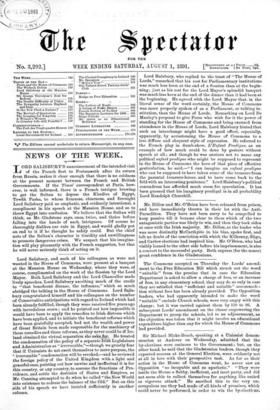Lord Halsbury, who replied to the toast of "The House
of Lords," remarked that hie zest for Parliamentary institutions was much less keen at the end of a Session than at the begin- ning; just as his zest for the Lord Mayor's splendid banquet was much less keen at the end of the dinner than it had been at the beginning. He agreed with the Lord Mayor that, in the literal sense of the word certainly, the House of Commons was more properly spoken of as a Parliament, or talking in- Bandon, than the House of Lords. Remarking on Lord De Mauley's proposal to give Peers who wish for it the power of standing for the House of Commons and being excused from attendance in the House of Lords, Lord Halsbnry hinted that such an interchange might have a good effect, especially, apparently, by accustoming the House of Commons to a less diffuse and eloquent style of expression. He referred to the French play in dumb-show, L'Enfant Prodigue, as an example of how much could be done by gesture without speech at all ; and though he was anxious not to name any political enfant prodigue who might be supposed to represent in the House of Commons the hero of that piece of effective gesticulation, he said,—" I can imagine an enfant prodigue who can be supposed to have taken some of the treasure from the parental treasure-house, and to have come back to the fold with an interesting penitence." Lord Haisbury's political conundrum has afforded much room for speculation. It has been guessed that his imaginary prodigal is in all probability Lord Randolph Churchill.


































